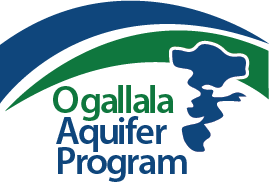OAP researchers develop and evaluate water management strategies and technologies, including dryland cropping systems, that could reduce water withdrawals for irrigation while maintaining and/or enhancing the economic viability of the agriculture industry and the vitality of the Southern Ogallala Aquifer Region. Projects include:
Title:
Assessing the impacts of broader adoption of deficit irrigation practices on groundwater conservation in an agricultural watershed
Abstract:
Declining groundwater levels in the Southern Ogallala Aquifer, recurring droughts, and projected warmer and drier future climatic conditions pose challenges for cotton (Gossypium hirsutum L.) production in the Texas High Plains (THP). Field experiments and modeling studies in the THP demonstrated/reported substantial savings in irrigation water with minimal yield loss when adopting deficit irrigation strategies. However, the effects of farm level irrigation water savings on regional groundwater conservation are largely unknown.
APEXMOD, a new integrated model developed by coupling MODFLOW groundwater flow model with the Agricultural Policy/Environmental eXtender (APEX) agroecosystem model, will be used to assess the impacts of wide-scale adoption of deficit irrigation practices on groundwater conservation and economic viability of agriculture in the Upper Double Mountain Fork of the Brazos River watershed. Changes in crop yield, crop water productivity (CWP) and groundwater levels under simulated scenarios will be compared with those under the baseline scenario (adoption of full irrigation in all growth stages). Model outputs on crop yields, irrigation water savings, and groundwater levels will then be used in the economic and risk analyses. Finally, the effects of projected climate change on ground water levels in the study watershed will be investigated under the full and deficit irrigation practices.
Investigators:
Srinivasulu Ale sriniale@ag.tamu.edu
Donna McCallister donna.mccallister@ttu.edu
Jourdan Bell Jourdan.bell@ag.tamu.edu
Dennis Gitz dennis.gitz@usda.gov
Research Areas:
Hydrological/Climatic Conditions
Irrigation Efficiency
Policy/Economic Viability
Title:
Evaluation of Perennial Forages for Limited Irrigated Southern Great Plains Forage Systems
Abstract:
As regional ground water supplies decline, producers are considering adaptive forage systems that use less water than irrigated corn to stabilize groundwater withdrawals. This will also help meet forage needs for the fed beef and dairy industry across the southern Ogallala region of the SW Texas Panhandle and Eastern New Mexico – the epicenter of the largest concentration of these operation in the U.S.
Due to water and forage shortages, many regional dairies are evaluating herd sizes or considering relocating, which has the potential to negatively impact rural economies. Stocker grazing operations and finished beef producers are also evaluating alternative forage options. Deficit irrigated perennial forages such as bermudagrass may minimize irrigation pressures, sustain regional stocker production, ensure adequate groundwater for livestock operations, and allow producers to concentrate water on higher water demanding crop to optimize the economic return per unit of water. Perennial forages may also sequester soil carbon and generate an additional revenue stream for producers. Because soil can be a source of greenhouse gases and a sink for carbon depending on management, soil carbon and greenhouse gas emissions will be quantified to accurately determine carbon sequestration, GHG emission change, and income potential. This research will evaluate the forage production of winter hardy bermudagrass cultivars compared to perennial grass species recommended by NRCS to 1) quantify forage yields, nutritive value, water use, and water use efficiencies of evaluated perennial forages, 2) quantify changes in soil carbon stocks and labile carbon and nitrogen parameters, 3) quantify the economic costs or benefits of perennial forages in SGP croplands, and 4) quantify greenhouse gas emissions (CO2, CH4, and N2O) from forage treatments.
Investigators:
Jourdan Bell Jourdan.bell@ag.tamu.edu
Ken Casey kdcasey@ag.tamu.edu
Kevin Heflin kevin.heflin@ag.tamu.edu
Andrew Wright Andrew.wright@ag.tamu.edu
Research Areas:
Alternative Crops BMPs
Irrigation Efficiency
Policy/Economic Viability
Title:
Collaborative Research on Cotton Production in Thermo-limited Regions of the High Plains
Abstract:
Cotton acreage has increased substantially in both Texas and Kansas over the last four years. If the growth trend continues, cotton may become one of the primary crops in these states. Several reasons for the expansion include the availability of improved short-season varieties, reduced water availability, and potential profitability of the crop. Cotton production could generate several positive benefits for the producer, the rural community, and the Ogallala Aquifer. Thus, a thorough examination of these impacts is warranted. In addition, the dissemination of knowledge concerning cotton agronomics, water management, entomology, and economics is necessary to assist producers in making informed decisions and implement best management practices.
Specifically, this research effort will conduct long-term research for irrigated cotton production in thermo-limited regions of the northern Texas Panhandle and Southwest Kansas by:
- developing cotton production recommendations through a multi-disciplinary systems approach in thermo-limited regions;
- transferring technology and expanding the expertise in cotton research being conducted in the Texas area to Southwest Kansas; and
- creating an industry advisory group to provide input regarding our research objectives and outcomes.
Investigators:
Jonathan Aguilar jaguilar@k-state.edu
Jourdan Bell Jourdan.bell@ag.tamu.edu
Craig Bednarz cbednarz@wtamu.edu
Bill Golden bgolden@k-state.edu
Bridget Guerrero bguerrero@wtamu.edu
Lucas Haag lhaag@ksu.edu
Haydee Laza haydee.laza@ttu.edu
Gary Marek gary.marek@usda.gov
Thomas Marek Thomas.marek@ag.tamu.edu
Donna McCallister donna.mccallister@ttu.edu
Dana Porter d-porter@tamu.edu
Glen Ritchie glen.ritchie@ttu.edu
Aleksey Sheshukov ashesh@ksu.edu
Andrew Wright Andrew.wright@ag.tamu.edu
Research Areas:
Alternative Crops BMPs
Dryland Cropping Systems
Irrigation Efficiency
Policy/Economic Viability
Presentations:
Title:
Cotton Maturity in the Texas Panhandle
Abstract:
Cotton crop maturity in the Texas Panhandle is sometimes limited due to lack of heat unit accumulation. However, the indeterminate growth habit of cotton may enable earlier crop maturity through proper management. Before Texas Panhandle growers can manage cotton crop maturity, we need a better understanding of maturity patterns in this region. We will discuss cotton crop maturity and physiological cutout in the Texas Panhandle and how it differs from the more traditional Target Development Curve.
Investigators:
Craig Bednarz cbednarz@wtamu.edu
Presentations:








